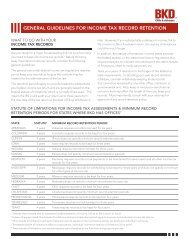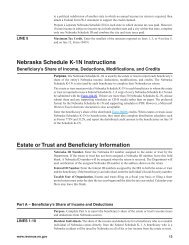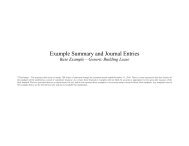While <strong>prevention</strong> techniques do not ensure <strong>fraud</strong> will not be committed, they are the first line of defense inminimizing <strong>fraud</strong> risk. One key to <strong>prevention</strong> is promoting from the board down throughout the organization anawareness of the <strong>fraud</strong> risk management program, including the types of <strong>fraud</strong> that may occur.Meanwhile, one of the strongest <strong>fraud</strong> deterrents is the awareness that effective detective controls are in place.Combined with preventive controls, detective controls enhance the effectiveness of a <strong>fraud</strong> risk managementprogram by demonstrating that preventive controls are working as intended and by identifying <strong>fraud</strong> if it doesoccur. Although detective controls may provide evidence that <strong>fraud</strong> has occurred or is occurring, they are notintended to prevent <strong>fraud</strong>.Every organization is susceptible to <strong>fraud</strong>, but not all <strong>fraud</strong> can be prevented, nor is it cost-effective to try. Anorganization may determine it is more cost-effective to design its controls to detect, rather than prevent, certain<strong>fraud</strong> schemes. It is important that organizations consider both <strong>fraud</strong> <strong>prevention</strong> and <strong>fraud</strong> detection.Investigation and Corrective ActionNo system of internal control can provide absolute assurance against <strong>fraud</strong>. As a result, the board should ensurethe organization develops a system for prompt, competent, and confidential review, investigation, and resolution ofinstances of noncompliance and allegations involving potential <strong>fraud</strong>. The board should also define its own role inthe investigation process. An organization can improve its chances of loss recovery, while minimizing exposure tolitigation and damage to reputation, by establishing and preplanning investigation and corrective action processes.The board and the organization should establish a process to evaluate allegations. Individuals assigned toinvestigations should have the necessary authority and skills to evaluate the allegation and determine theappropriate course of action. The process should include a tracking or case management system where allallegations of <strong>fraud</strong> are logged. Clearly, the board should be actively involved with respect to allegationsinvolving senior management.If further investigation is deemed appropriate as the next course of action, the board should ensure that theorganization has an appropriate and effective process to investigate cases and maintain confidentiality. A consistentprocess for conducting investigations can help the organization mitigate losses and manage risk associated with theinvestigation. In accordance with policies approved by the board, the investigation team should report its findings tothe appropriate party, such as senior management, directors, legal counsel, and oversight bodies. Public disclosuremay also need to be made to law enforcement, regulatory bodies, investors, shareholders, the media, or others.If certain actions are required before the investigation is complete to preserve evidence, maintain confidence,or mitigate losses, those responsible for such decisions should ensure there is sufficient basis for those actions.When access to computerized information is required, specialists trained in computer file preservation should beused. Actions taken should be appropriate under the circumstances, applied consistently to all levels of employees(including senior management), and taken only after consultation with human resources (HR) and individualsresponsible for such decisions. Consulting legal counsel is also strongly recommended before undertaking aninvestigation and is critical before taking disciplinary, civil, or criminal action. As a matter of good governance,management and the board should ensure that the foregoing measures are in place.9
Thus, to properly address <strong>fraud</strong> risk within the organization, principles described in the following sections of thispaper are needed to make sure:• Suitable <strong>fraud</strong> risk management oversight and expectations exist (governance) — Principle 1.• Fraud exposures are identified and evaluated (risk assessment) — Principle 2.• Appropriate processes and procedures are in place to manage these exposures (<strong>prevention</strong> and detection)— Principles 3 & 4.• Fraud allegations are addressed, and appropriate corrective action is taken in a timely manner (investigationand corrective action) — Principle 5. 9SECTION 1: FRAUD RISK GOVERNANCEPrinciple 1: As part of an organization’s governance structure, a <strong>fraud</strong> risk management program shouldbe in place, including a written policy (or policies) to convey the expectations of the board of directorsand senior management regarding managing <strong>fraud</strong> risk.Corporate governance has been defined in many ways, including “The system by which companies are directedand controlled,” 10 and “The process by which corporations are made responsive to the rights and wishes ofstakeholders.” 11 Corporate governance is also the manner in which management and those charged with oversightaccountability meet their obligations and fiduciary responsibilities to stakeholders.Business stakeholders (e.g., shareholders, employees, customers, vendors, governmental entities, communityorganizations, and media) have raised the awareness and expectation of corporate behavior and corporategovernance practices. Some organizations have developed corporate cultures that encompass strong boardgovernance practices, including:• Board ownership of agendas and information flow.• Access to multiple layers of management and effective control of a whistleblower hotline.• Independent nomination processes.• Effective senior management team (including chief executive officer (CEO), chief financial officer, and chiefoperating officer) evaluations, performance management, compensation, and succession planning.• A code of conduct specific for senior management, in addition to the organization’s code of conduct.• Strong emphasis on the board’s own independent effectiveness and process through board evaluations,executive sessions, and active participation in oversight of strategic and risk mitigation efforts.These corporate cultures also include board assurance of business ethics considerations in hiring, evaluation,promotion, and remuneration policies for employees as well as ethics considerations in all aspects of theirrelationships with customers, vendors, and other business stakeholders. Effective boards and organizations will also9The Open Compliance and Ethics Gro<strong>up</strong> (OCEG) Foundation principles displayed in Appendix F of this document also provide guidance onunderlying principles of good governance relative to <strong>fraud</strong> risk management.10Sir Adrian Cadbury, The Committee on the Financial Aspects of Corporate Governance.11Ada Demb and F. Friedrich Neubauer, The Corporate Board: Confronting the Paradoxes.10
- Page 1 and 2: ACFE FRAUD PREVENTIONCHECK-UP
- Page 3 and 4: ACFE FRAUD PREVENTIONCHECK-UPThe Be
- Page 5 and 6: ACFE FRAUD PREVENTIONCHECK-UPACFE F
- Page 7 and 8: ACFE FRAUD PREVENTIONCHECK-UPACFE F
- Page 9 and 10: ACFE FRAUD PREVENTIONCHECK-UPACFE F
- Page 11 and 12: ACFE FRAUD PREVENTIONCHECK-UPACFE F
- Page 13 and 14: Sponsored by:The Institute of Inter
- Page 15 and 16: Team Members:Toby J.F. Bishop, CPA,
- Page 17 and 18: Managing the Business Risk of Fraud
- Page 19 and 20: establish their own fraud risk mana
- Page 21: Fraud risk identification may inclu
- Page 25 and 26: The board also has the responsibili
- Page 27 and 28: • Implementing adequate internal
- Page 29 and 30: Fraud Risk Management Program Compo
- Page 31 and 32: ecently been hired in the purchasin
- Page 33 and 34: Organizations can identify and asse
- Page 35 and 36: The Risk Assessment TeamA good risk
- Page 37 and 38: This also involves understanding th
- Page 39 and 40: - Invoices for goods not received o
- Page 41 and 42: Other RisksRegulatory and Legal Mis
- Page 43 and 44: SECTION 3: FRAUD PREVENTIONPrincipl
- Page 45 and 46: An organization’s HR group is oft
- Page 47 and 48: SECTION 4: FRAUD DETECTIONPrinciple
- Page 49 and 50: Process ControlsProcess controls sp
- Page 51 and 52: keep such information confidential.
- Page 53 and 54: will vary depending on the nature,
- Page 55 and 56: Conducting the InvestigationPlannin
- Page 57 and 58: • Extended investigation — Cond
- Page 59 and 60: Fraud ControlsDeloitte Forensic Cen
- Page 61 and 62: APPENDIX B: SAMPLE FRAMEWORK FOR A
- Page 63 and 64: APPENDIX C: SAMPLE FRAUD POLICY 41N
- Page 65 and 66: CONFIDENTIALITYThe ______________ U
- Page 67 and 68: Sample Fraud Policy Decision Matrix
- Page 69 and 70: Identified Fraud Risksand Schemes (
- Page 71 and 72: 2) Misappropriation of:a) Tangible
- Page 73 and 74:
) Embezzlement(1) False accounting
- Page 75 and 76:
Fraud Prevention Area, Factor, or C
- Page 77 and 78:
Fraud Prevention Area, Factor, or C
- Page 79 and 80:
Fraud Prevention Area, Factor, or C
- Page 81 and 82:
Fraud Prevention Area, Factor, or C
- Page 83 and 84:
O-Organization / PersonnelO1-Leader
- Page 85 and 86:
O4.3 Enhance Operational Skills & C
- Page 87 and 88:
PR-Prevent, Protect & PreparePR1-Ge
- Page 89 and 90:
E-Periodic EvaluationE1-Evaluation
- Page 91 and 92:
I2-CommunicationI2.1 Develop Commun
- Page 93 and 94:
CriminologyFraud Prevention Program
- Page 95 and 96:
CriminologyFraud Prevention Program
- Page 97 and 98:
CriminologyFraud Prevention Program
- Page 99 and 100:
CriminologyFraud Prevention Program
- Page 101 and 102:
CriminologyFraud Prevention Program
- Page 103 and 104:
CriminologyFraud Prevention Program
- Page 105 and 106:
CriminologyFraud Prevention Program
- Page 107 and 108:
CriminologyFraud Prevention Program
- Page 109 and 110:
CriminologyFraud Prevention Program
- Page 111 and 112:
CriminologyFraud Prevention Program
- Page 113 and 114:
CriminologyFraud Prevention Program
- Page 115 and 116:
CriminologyFraud Prevention Program
- Page 117 and 118:
Sample Fraud PolicyAssociation of C
- Page 119 and 120:
Sample Fraud PolicyCONFIDENTIALITYT
- Page 121 and 122:
Sample Fraud PolicyFraud Policy Dec
- Page 123 and 124:
Fraud’s Worst Enemyhttp://www.fra
- Page 125 and 126:
ACFE Insights - ACFE Insightshttp:/
- Page 127:
ACFE Insights - ACFE Insightshttp:/









